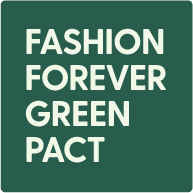
our fashion PARTNERS
Making a difference in the world is not a one-person or one-organization job. Achieving the ambitious and necessary change in the fashion and textile industry that People and Planet need takes joint effort. Together with and inspired by our partners and the industry itself, FSC strives to facilitate change and find solutions to the challenges that we are facing.
750+
Canopy is an environmental non-profit working with 750+ businesses to transform supply chains and keep the world’s forests and species vibrant.
businesses joint forces
500+
have now partnered with CanopyStyle, an initiative aiming to keep the world’s endangered forests out of viscose/rayon clothing. When virgin forest fibres are required, Canopy advocates for sustainable sourcing certified by the Forest Stewardship Council, the most rigorous forest certification system available.
brands
150+
Canopy also has a new Pack4Good initiative, which has galvanized over 150 brands to transform their paper packaging supply chain and to scale up the use of recycled and low impact alternative fibres.
brands
“Canopy is proud to spearhead the fastest moving environmental initiative in the apparel sector in partnership with more than 500 iconic fashion brands to end the use of endangered forests in their clothes. We're excited that brands are giving preference to FSC-certified materials, and that this is translating into more mills gaining certification, and ultimately more forests being certified to FSC forest management standards.”
-Nicole Rycroft
Founder And Executive Director, Canopy
Made2Flow is a tech company specializing in data gathering and analysis of environmental data in the fashion industry. Through machine learning-based solutions, Made2Flow gathers data directly from production partners, which can then be validated, benchmarked, and translated into environmental impact indicators such as CO2, water, biodiversity, and energy. With this insight, brands are empowered to develop sustainable supply chains and focus on their hotspots, manufacture products with lower environmental impact, and reach their science-based targets.
FSC and Made2Flow has joined forces to develop solutions for designers in the fashion industry.
Design-by-Impact is a revolutionary decision-making solution for product teams to develop styles with lower environmental impact: GHG, Water-Use etc.
It empowers designers & merchandisers to compare the environmental impact of different design scenarios ("what if scenarios") and make better decisions based on real-time, validated primary data.
TextileGenesis is a pioneering traceability platform custom built for the fashion and textile ecosystem. Their blockchain-based system creates radical transparency and traceability from fibre to retail and ensures authenticity and provenance of sustainable textiles against generics.
Jointly FSC and Textile Genesis are exploring how our two systems might interact and support each other for greater impact.
30 mn+
products
50+
brands
1500+
suppliers
Global Fashion Agenda is a non-profit organization that fosters industry collaboration on sustainability in fashion to drive change and accelerate climate impact reductions. The GFA has been taking on a leading role in the sustainability movement since 2009, and they are educating and inspiring the industry with their yearly Global Fashion Summit, an Innovation Forum, leadership publications like Fashion CEO Agenda and Fashion on Climate and impact programmes like the Circular Fashion Partnership.
Global Fashion Agenda has chosen FSC as an innovation partner and point to FSC as one of their suggested solutions for fashion companies.
13%
of the global fashion market
1500+
tonnes of textile waste
100+
events
UN Fashion Charter
Under the auspices of UN Climate Change, fashion stakeholders have worked to identify ways in which the broader textile, clothing and fashion industry can move towards a holistic commitment to climate action. In 2018, this work materialized with the launch of the Fashion Industry Charter for Climate Action.
The Charter goes beyond previous industry-wide commitments, and work is guided by its mission to drive the fashion industry to net-zero greenhouse gas emissions by 2050 in line with keeping global warming below 1.5 degrees.
Signatories and Supporting Organizations of the Charter are committing to working collaboratively to deliver on the commitments enshrined in the document. This is done through Working Groups bringing together relevant stakeholders, experts and initiatives in the fashion and broader textile sector.










